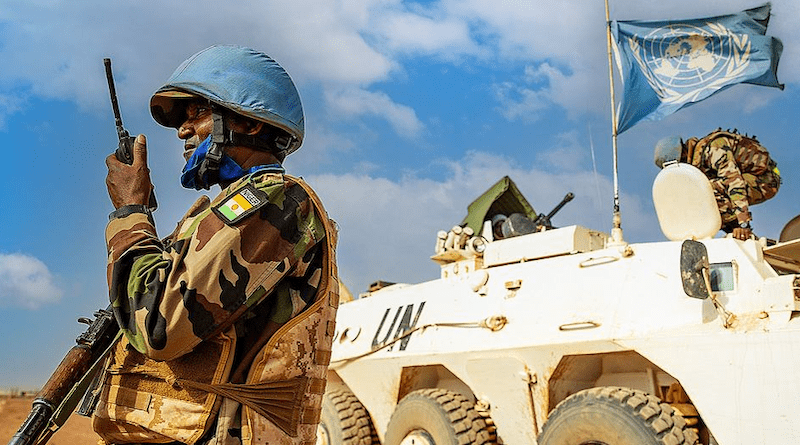Peacekeepers Pullout From Mali As Per UN Decision – OpEd
In response to an express request from the junta government in Mali, the UN Security Council decided on June 29 in a unanimous vote to end the peacekeeping deployment there. The choice affects all 13,000 MINUSMA forces from different countries, including Bangladesh, Germany, France, Britain, and Egypt. However, some parties are connecting it to pressure placed on Bangladesh due to US sanctions and upcoming election issues. They are spreading rumors that the US sanctions will force the Bangladeshi peacekeepers to leave Mali. No doubt, it’s just propaganda by vested groups that are pushing for a ban on Bangladesh participating in UN peacekeeping deployments for narrow political reasons.
Currently, Mali is home to over 13,000 peacekeepers from a variety of nations, including Bangladesh. By the terms of the adopted resolution [resolution UNSC S/2023/480 dated June 29], the mission will completely withdraw from the landlocked nation of Mali by December 31, 2023. Not only 1700 Bangladeshis, but all peacekeepers from a number of countries, will have to return to their home countries by this period.
In accordance with Resolution 2100 of April 25, 2013, the UN Security Council appointed the mission (MINUSMA) in Mali. Mali and the Sahel region have experienced an increase in confrontations and attacks by armed groups and terrorist organizations during the past ten years. Conditions have also worsened due to climate shocks and rising intercommunal tensions over scarce resources, which have become the main drivers of continued violence, mass displacement, instability, and cross-border trafficking. With 303 peacekeepers killed, MINUSMA is the deadliest UN peacekeeping operation. With a budget of $1.2 billion, MINUSMA is also the UN’s most expensive mission.
However, with the UN mission lifting, experts worry that fresh bloodshed will start to spread in the nation prone to war. Due to insecurity and climate change shocks, one in four Malians is already at risk of starvation. According to the UN, at least 7.5 million people in a country of 22 million are in need of humanitarian assistance. The activities of aid and development organizations that rely on the protection provided by the UN mission would be impacted by the peacekeepers’ exit. This will undoubtedly have a grave security impact on the civilian population.
This withdrawal notice was made less than a week after the UN Peacekeeping Ministerial 2023 preparatory meeting in Dhaka. It is worth mentioning that, while in Dhaka on June 25, UN Under-Secretary-General for Peace Operations Jean-Pierre Lacroix and UN Under-Secretary-General for Management Strategy, Policy, and Compliance Catherine Pollard commended Bangladesh’s commitment to peacekeeping and efforts to increase the number of women peacekeepers.
Bangladesh started her journey in UN peacekeeping operations with the deployment of only 15 peacekeepers in the Iran-Iraq Military Observer Group (UNIIMOG) in 1988. Bangladeshi peacekeepers are now the top troop-contributing country in the world, with a total of 7,436 peacekeepers deployed on UN missions or assignments in 14 countries. Till now, 188,558 Bangladeshi peacekeepers have successfully participated in 63 UN missions or assignments in around 40 countries or locations. Bangladeshi peacekeepers have left their marks in nearly every region rife with violence, from Haiti to East Timor, Lebanon to the Congo.
For UN forces, Mali is regarded as the world’s most unsettling and hazardous country. In an unstable and fragile political and security structure with an unprecedented level of violence and insecurity, Bangladeshi forces have been actively conducting peacekeeping and peacebuilding operations for the past ten years. Despite being a tropical country, the Bangladeshi forces have acquired experience serving in the harsh and hostile conditions prevailing in Northern and Central Mali, where temperatures swing between 35 and 52 degrees Celsius.
Being continually threatened by Improvised Explosive devices (IEDs), the Bangladesh Army engineering contingent (BANENGR) was involved in building an airport at Kidal, located in the Sahara Desert. In the operational Areas of Responsibility (AOR) of MINUSMA, the Bangladesh Signals contingent served as the backbone of communication for multimodal movements and operational campaigns for the UN peacekeepers, European forces, and other agencies. In the most dangerous areas of Northern Mali, the Bangladesh Air Force contingent is the key communication conduit. The Bangladesh Battalion (BANBAT) female engagement team continues its efforts to build a trusting relationship between the UN troops and the local communities in the conflict zones.
Bangladesh contingents stationed in Mali have a solid and successful track record of accomplishments that have won them recognition from the international community and the people of Mali’s unwavering love. The Bangladeshi forces’ professionalism and tenacity set them apart.
While the counter-terrorism campaigns led by other forces often became counterproductive, causing social and political resentment, Bangladeshi peacekeepers’ all-encompassing social approach is globally recognized. The Bangladesh contingent is engaged in de-escalation of tensions and threats and building community confidence in favor of peacekeeping troops. The success of Operation Mongoose in Central Mali in October 2020, under the direction of BANBAT, was worth mentioning.
Bangladeshis must be proud of their peacekeepers, who have brightened the country’s image globally. Given their operational prowess and widespread popular support, we believe that they will play a key role in securing long-lasting peace, stability, and reconciliation efforts anywhere in the world. We hope Bangladesh’s blue helmet will continue to grow and will remain a power base for the international community in delivering peace.

